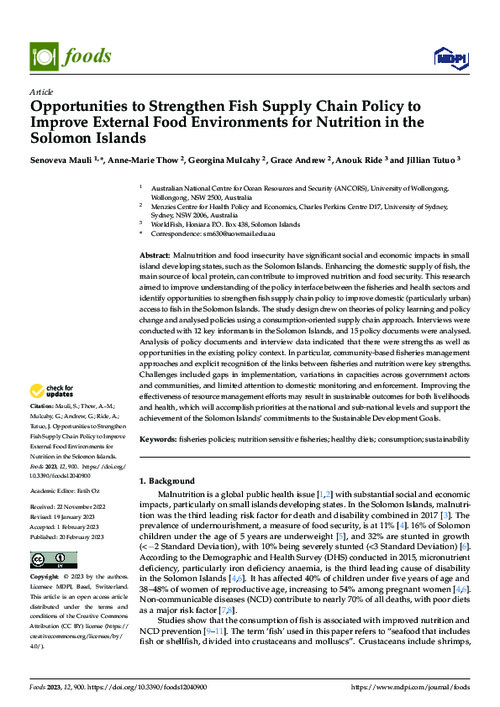Please use this identifier to cite or link to this item:
https://hdl.handle.net/20.500.12348/5792
Opportunities to Strengthen Fish Supply Chain Policy to Improve External Food Environments for Nutrition in the Solomon Islands
| dc.creator | Mauli, S. | en_US |
| dc.creator | Thow, A.M. | en_US |
| dc.creator | Mulcahy, G. | en_US |
| dc.creator | Andrew, G. | en_US |
| dc.creator | Ride, A. | en_US |
| dc.creator | Wate, J. | en_US |
| dc.date.accessioned | 2024-01-21T05:53:14Z | |
| dc.date.available | 2024-01-21T05:53:14Z | |
| dc.date.issued | 2023 | en_US |
| dc.identifier.citation | Senoveva Mauli, Anne Thow, Georgina Mulcahy, Grace Andrew, Anouk Ride, Jillian Tutuo Wate. (20/2/2023). Opportunities to Strengthen Fish Supply Chain Policy to Improve External Food Environments for Nutrition in the Solomon Islands. Foods, 12(4). | en_US |
| dc.identifier.issn | 2304-8158 | en_US |
| dc.identifier.uri | https://hdl.handle.net/20.500.12348/5792 | |
| dc.description.abstract | Malnutrition and food insecurity have significant social and economic impacts in small island developing states, such as the Solomon Islands. Enhancing the domestic supply of fish, the main source of local protein, can contribute to improved nutrition and food security. This research aimed to improve understanding of the policy interface between the fisheries and health sectors and identify opportunities to strengthen fish supply chain policy to improve domestic (particularly urban) access to fish in the Solomon Islands. The study design drew on theories of policy learning and policy change and analysed policies using a consumption-oriented supply chain approach. Interviews were conducted with 12 key informants in the Solomon Islands, and 15 policy documents were analysed. Analysis of policy documents and interview data indicated that there were strengths as well as opportunities in the existing policy context. In particular, community-based fisheries management approaches and explicit recognition of the links between fisheries and nutrition were key strengths. Challenges included gaps in implementation, variations in capacities across government actors and communities, and limited attention to domestic monitoring and enforcement. Improving the effectiveness of resource management efforts may result in sustainable outcomes for both livelihoods and health, which will accomplish priorities at the national and sub-national levels and support the achievement of the Solomon Islands’ commitments to the Sustainable Development Goals. | en_US |
| dc.format | en_US | |
| dc.language | en | en_US |
| dc.publisher | MDPI | en_US |
| dc.rights | CC-BY-4.0 | en_US |
| dc.source | Foods;12(4),(2023) | en_US |
| dc.subject | fisheries policies | en_US |
| dc.subject | nutrition sensitive fisheries | en_US |
| dc.title | Opportunities to Strengthen Fish Supply Chain Policy to Improve External Food Environments for Nutrition in the Solomon Islands | en_US |
| dc.type | Journal Article | en_US |
| cg.contributor.funder | Australian Center for International Agricultural Research | en_US |
| cg.contributor.funder | University of Wollongong | en_US |
| cg.coverage.country | Solomon Islands | en_US |
| cg.coverage.region | Melanesia | en_US |
| cg.subject.agrovoc | sustainability | en_US |
| cg.subject.agrovoc | consumption | en_US |
| cg.subject.agrovoc | healthy diets | en_US |
| cg.subject.agrovoc | fish | en_US |
| cg.contributor.affiliation | University of Sydney | en_US |
| cg.contributor.affiliation | WorldFish | en_US |
| cg.contributor.affiliation | University of Wollongong, Australian National Center for Ocean Resources & Security | en_US |
| cg.identifier.status | Open access | en_US |
| cg.identifier.ISIindexed | ISI indexed | en_US |
| cg.contribution.worldfishauthor | Ride, A. | en_US |
| cg.contribution.worldfishauthor | Wate, J. | en_US |
| cg.description.theme | Resilient small-scale fisheries | en_US |
| dc.identifier.doi | https://dx.doi.org/10.3390/foods12040900 | en_US |
| cg.subject.actionArea | Resilient Agrifood Systems | en_US |
| cg.contributor.initiative | Aquatic Foods | en_US |
